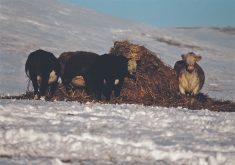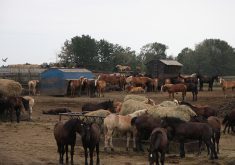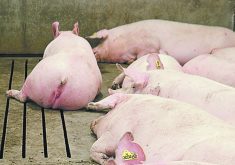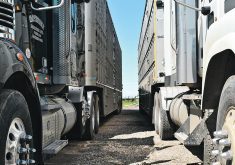BANFF, Alta. — There’s probably a protest aimed at improving animal rights or animal welfare, somewhere in Canada, every day. Livestock producers and transporters are sometimes challenged to deal with them.
The best way, and in Geraldine Auston’s view the only way, is to always do the right thing.
She said that means handling animals humanely in ways no one would be ashamed to see on video or in photographs.
Auston works for the Ag and Food Exchange, a service to help farmers, truckers and agri-businesses handle pressure from special interest groups.
Read Also

Beef check-off collection system aligns across the country
A single and aligned check-off collection system based on where producers live makes the system equal said Chad Ross, Saskatchewan Cattle Association chair.
She told those at the Banff Pork Seminar earlier this year that protests outside slaughter plants and at truck stops are becoming more common and frequent in Canada.
The court case involving Anita Krajnc, who was charged in 2015 with mischief after giving pigs water while they were on a trailer en route to slaughter, has raised the profile of such protests, said Auston.
Final arguments in Krajnc’s case are scheduled to be heard in March, but other members of the Pig Save movement sometimes stand at slaughter plants where they “bear witness” to animals being delivered.
“I think at some point it would help you to understand the difference that what we do in agriculture and food production, it’s not aligned with the animal rights agenda,” Auston told pork producers.
“You don’t need to respect what animal rights activists do, but you do need to respect their beliefs.”
Animals in transport are frequent targets for protest because that is when they are most visible to the public, she said. Situations where people delay or stop trucks that are delivering animals must be handled with care, keeping safety of people and the animals in mind.
Auston advised livestock truckers to communicate well with the plant and company regarding delivery times, biosecurity and food safety.
If activists block a truck, she advised drivers to stay calm, stay inside the vehicle and contact plant security or the police for assistance. They should keep their composure and assume they are on video.
“Don’t think you have to handle this yourself,” Auston advised truckers. “Lean on other people to help you out.”
Livestock haulers have responsibility for animal welfare, and delays caused by protest can cause additional stress to the animals aboard.
Regulations regarding livestock transport are being updated in Canada. Animal rights activists are providing input so producers should too, said Auston.
As well, activists use social media to advantage. One example is a Mercy for Animals investigation at Alberta’s Western Hog Exchange several years ago, which is still available online.
“We have to remember that they’re getting access in a way that we aren’t (to the general public),” said Auston.
She encouraged livestock producers to make sure employees are well trained in proper livestock care and handling.
They should also use the Code of Practice for the Care and Handling of Pigs, and ensure livestock transporters have current certification through the Canadian Livestock Transport Certification Program.
Auston said the best protection is to do things right, “not because you think you’re being watched” but because animal welfare is vital.


















